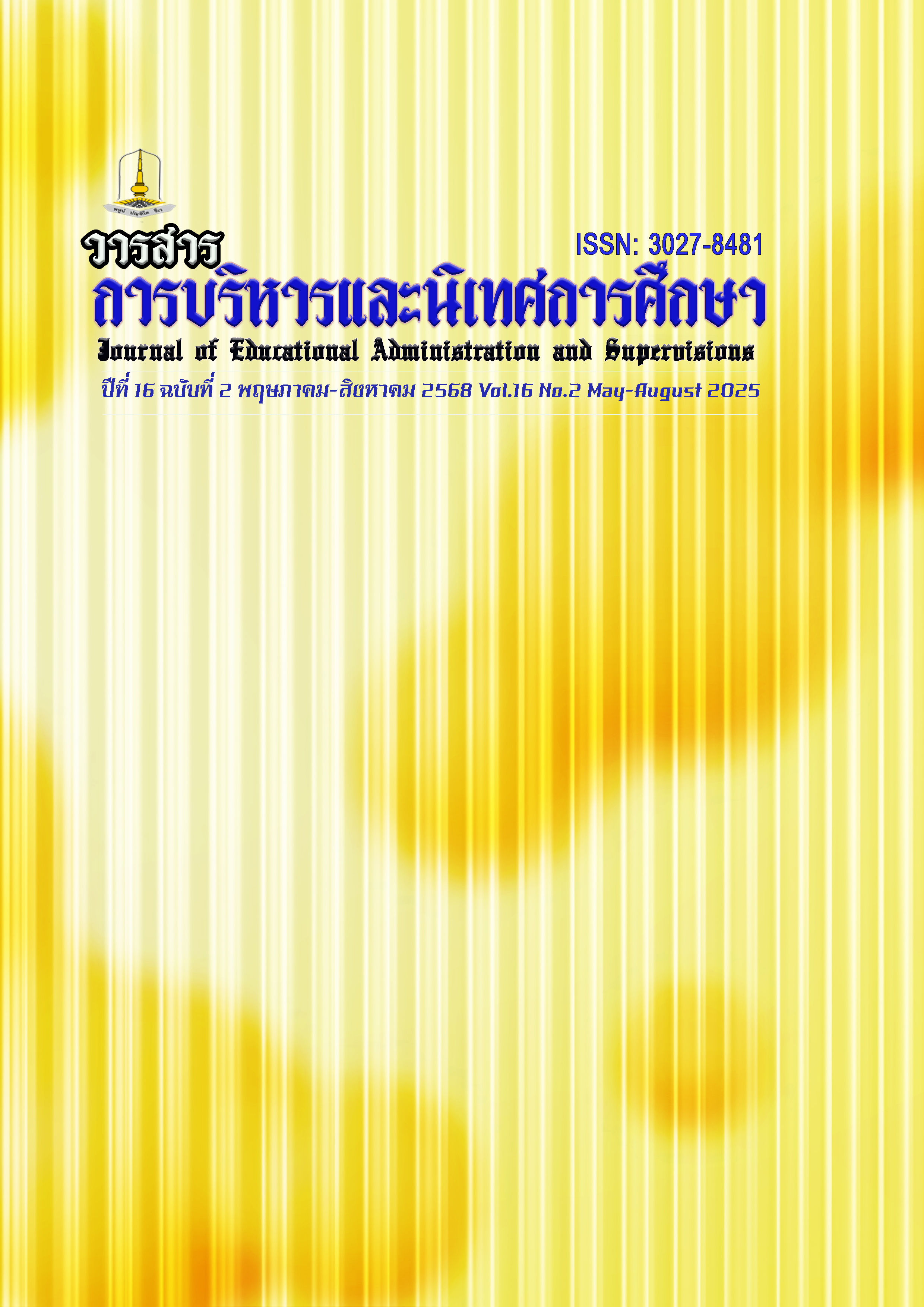A Teacher Development Model in Learning Management Focusing on 21st - century Skills Using the Mentoring Supervision Process along with the Professional Learning Community of Thesaban 1 School (Wat Thewsangkharam) under the Royal Patronage of the Supreme Patriarch
Main Article Content
Abstract
This research was focused on research and development with the following objectives: 1) to study the basic information 2) to develop the teacher development model
for learning management that focusing on 21st
-century skills by using the mentoring supervision process with the professional learning community 3) to study the result of the
model conduction, and 4) to assess the satisfaction to the model. The target group for
teacher development included 43 teachers. The sample group for assessing 21st -century skills consisted of 248 primary school students from grades 1 to 6 in the first semester of the 2024
academic year, selected through stratified random sampling technique. The tools used in the researched were questionnaires, interviews form, focus group discussions, operation manuals, teacher competence for learning management focusing on 21st -century skills assessment forms, assessment forms for 21st
-century skills of students, and questionnaires on satisfaction with the model. Data were analyzed by frequency, percentage, mean, standard deviation. The hypothesis testing was with t-test (Dependent Samples), and descriptive analysis.
The results of the research showed that, 1) the basic information on the working
environment in learning management that focusing on 21st -century skills of Thesaban 1 School (Wat Thewasangkharam) under the patronage of the Supreme Patriarch was at a moderate level in overall ( = 2.68,
= 0.53) and the need for teacher development in learning management that focusingon 21st -century skills of which as a whole was at high level (
= 4.25,
= 0.62) with the overall need index PNI Modified = 0.585, 2) the result of the development of the teacher development model in learning management focusing on 21st -century skills using the mentoring process with the professional learning community found that the academic administration model consisted of 6 components as following: 1) principles 2) objectives 3) work system and mechanisms 4) work process 5) evaluation guidelines and 6) conditions of the model implementation. The work process was divided
into 4 steps including: 1) preparation 2) teaching observations 3) data collection and analysis and 4) guidance meeting and improvement of teaching. The result of assessing the quality of the model by the experts found that the quality was at the highest level in overall, 3) the study of working process based on the model found that teachers were capable in learning management focusingon 21st -century skills at the highest level ( = 4.51,
= 1.16) and effecting to the students having significantly higher 21st -century skills at the .01 level, and 4) the results of the evaluation of the satisfaction with the model were at the highest level in overall (
= 4.52,
= 0.75).
Downloads
Article Details

This work is licensed under a Creative Commons Attribution-NonCommercial-NoDerivatives 4.0 International License.
References
เงาแข เดือดขุนทด. (2564). รูปแบบการพัฒนาทักษะการจัดการเรียนรู้สำหรับครูในศตวรรษที่ 21 ของโรงเรียนฉะเชิงเทราปัญญานุกูล จังหวัดฉะเชิงเทรา. โรงเรียนฉะเชิงเทราปัญญานุกูล จังหวัดฉะเชิงเทรา.
ณฐวัฒน์ ล่องทอง. (2565). การปรับตัวให้เข้ากับการเปลี่ยนแปลงในศตวรรษที่ 21 เพื่อความสุขในการทำงาน. คณะมนุษยศาสตร์ มหาวิทยาลัยเชียงใหม่.
เทศบาลเมืองกาญจนบุรี, (2565). รายงานการประเมินคุณภาพการศึกษาของสถานศึกษาสังกัดเทศบาลเมืองกาญจนบุรี ประจำปีการศึกษา 2565. กรมส่งเสริมการปกครองส่วนท้องถิ่น กระทรวงมหาดไทย.
บุญชม ศรีสะอาด. (2556). การวิจัยเบื้องต้น (พิมพ์ครั้งที่ 9). สำนักพิมพ์สุวิริยาสาส์น.
ระพีพัฒน์ หาญโสภา, พระมหาศุภชัย ศุภกิจโจ, และประยุทธ ชูสอน. (2563). การพัฒนาทักษะการเรียนรู้ในศตวรรษที่ 21 สำหรับโรงเรียนร่มโพธิ์ทองธรรมวิทย์. วารสารสังคมศาสตร์และมานุษยวิทยาเชิงพุทธ, 5(11), 18-31. https://so04.tci-thaijo.org/index.php/JSBA/article/view/245162/167890
โรงเรียนเทศบาล ๑ (วัดเทวสังฆาราม) ในพระสังฆราชูปถัมภ์. (2565). รายงานการประเมินตนเองโรงเรียนเทศบาล ๑ (วัดเทวสังฆาราม) ในพระสังฆราชูปถัมภ์ปีการศึกษา 2565. เทศบาลเมืองกาญจนบุรี.
วรพจน์ วงศ์กิจรุ่งเรือง, และอธิป จิตตฤกษ์. (2554). ทักษะแห่งอนาคตใหม่ : การศึกษาเพื่อศตวรรษที่ 21. https://so04.tci-thaijo.org/index.php/kjss/article/view/247130/167888
วิจารณ์ พานิช. (2555). วิถีสร้างการเรียนรู้เพื่อศิษย์ในศตวรรษที่ 21. มูลนิธิสดศรี-สฤษดิ์วงศ์.
อัญชลี ธรรมะวิธีกุล. (2552). เทคนิคการนิเทศ: ระบบพี่เลี้ยงและการให้คำปรึกษา (Mentoring). https://panchalee.wordpress.com/2009/07/28/mentoring/
DuFour, R. (2007). Professional learning communities: A bandwagon, an idea worth considering, or our best hope for high levels of learning. Middle School Journal, 39(4), 1–8. https://eric.ed.gov/?id=EJ775771
Sergiovanni, T. (1994). Building community in schools. Jossey Bass.
Trilling, B., & Fadel, C. (2009). 21st Century Skills: Learning for Life in Our Times. Jossey-Bass.


